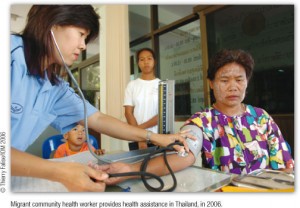Lack of health services for migrants a concerning issue
Wednesday, December 14th, 2011 11:44:12 by Fayyaz Yaseen
Lack of health services for migrants a concerning issue
GENEVA- 18 December 2011 – The lack of adequate access to health services for migrants in most countries is a worrying public health omission requiring urgent redress in a world increasingly dependent on human mobility, says IOM as it marks
International Migrants Day today.
With more than one billion migrants worldwide, 214 million of them international migrants, every country in the world is either dependent on the labour, skills and knowledge migrants bring or on the estimated US$ 404 billion they remitted in 2011.
Yet one of the biggest challenges facing global health today is migration. Migrants are among the most affected by the lack of access to health services. Linguistic or cultural differences, a lack of affordable health services or health insurance, administrative
hurdles, legal status and the fact that migrants often work extremely long and unsocial hours, are among their key barriers.
Undocumented migrants, often at risk from violence, exploitation, poor living and unsafe working conditions due to their irregular legal status, are the most vulnerable among the migrant groups. The fear of deportation also means irregular migrants don’t seek
health assistance unless it’s an emergency or too late.
"There is an acceptance among States to address the health inequities among vulnerable communities in their countries. This acknowledgement needs to include migrants who unfortunately remain among the most discriminated and vulnerable group in today’s society
and who continue to be largely invisible on the global health agenda," says IOM Director General William Lacy Swing.
Currently, only a very few countries in the world offer access to health services for all, including irregular migrants. Examples include Argentina, Brazil, France, Portugal and Spain.
Despite recent health crises such as SARS (Severe Acute Respiratory Syndrome) and the Avian influenza and the re-emergence of diseases such as tuberculosis underlining the urgent necessity of including migrants into health care systems, global progress on this
issue is painfully slow.
A few positive steps forward in the migrant health debate include Resolution 61.17 of the 2008 World Health Assembly, which urges Members of the WHO to promote the health of migrants, the European Parliament’s Resolution on Reducing Health Inequities in the
EU in March 2011 and the Dhaka Declaration by Asian migrant origin countries in April this year calling for migrant inclusive health policies for their nationals in destination countries.
"Significant as these steps are, what’s needed is for declarations and resolutions to turn into concrete, tangible action. And for more countries to join the list of those that do provide equal access to health services for all. To do so makes human, economic
and social sense," Swing adds.
Restricting irregular migrants to only emergency care, says IOM, is not based on sound public health principles. Such restrictions lead to poor health outcomes for the individual and increases public health risks, particularly if it concerns infectious diseases.
It is also ultimately more expensive than if migrants had access to preventive and primary health care.
Despite political and social sensitivities on migration, most governments have recognized that migrants are an economic necessity that countries cannot do without. But, IOM argues, migrants are above all human beings who should not be seen as mere commodities
representing an economic value that are easily replaceable.
"Migrants have proved time and again their positive contribution to the development of societies and economies. Their exclusion from health services and policies is not only a denial of the basic human right to health but also a misguided pandering to public
fears and perceptions of migrants as a burden on social services," states Director General Swing. "It is now time for countries to be bold, to take action and uphold a tenet they ascribe to – the right to health for all."
Short URL: https://www.newspakistan.pk/?p=6177

















